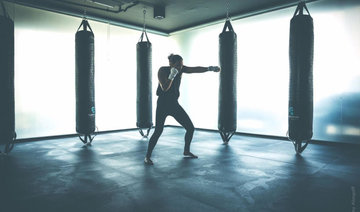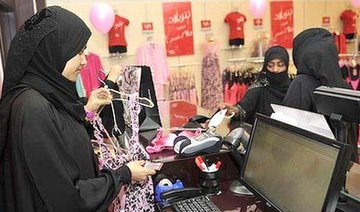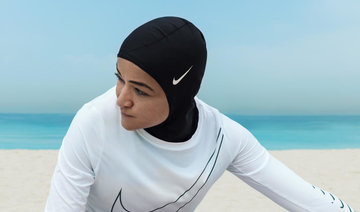JEDDAH: She is a rarity in the foreign diplomatic corps in Jeddah. Ever since she arrived in January 2015 for her first foreign posting as Italy’s consul general, Elisabetta Martini has carved a niche for herself and her country through her extraordinary work and outreach efforts. On the eve of International Women’s Day, she spoke to Arab News about the challenges she has faced as a female diplomat, and her observations about Saudi women.
She chose Saudi Arabia as her diplomatic posting “because it was an extremely challenging post, and that was the hook for me. When somebody throws a challenge at me I immediately accept it. When I was asked to apply for foreign posts, I chose Jeddah.”
Martini describes Saudi Arabia as “a very powerful country in terms of natural resources, in terms of being a regional power, a country that maintains the regional balance in the Middle East. Before coming here, I knew of Saudi Arabia as a giant that wasn’t fully awake. It has the potential to become the most powerful country in the region.”
She started her diplomat career in 2012. She was posted in Rome for two years, where she dealt mostly with European affairs and foreign policy. She graduated in political science and completed her master’s in international relations.
She interned for six months at the Italian Embassy in Washington, DC, while she was doing research for her final thesis at John Hopkins University. The subject of her thesis was the Silk Road. During her time in the US, she was associated with a well-known Italian think tank, the International Affairs Institute (IAI). “That’s when I realized the importance of think tanks,” she said.
From the US, Martini moved to Brussels as the assistant of the representative of the Italian Senate at the European Parliament. “That was an extremely useful experience for me,” she said.
Later, she worked as an export manager for a German design company. “I represented this German firm and I used to sell a lot of their products to mostly Arab clients,” she said. All this experience stood her in good stead. “I got to know the private sector, the powerful role of think tanks and then the public sector,” she said.
In the first week of her arrival in Jeddah, King Abdullah died. “So change started to happen very quickly. That was another challenge for me, because my first public appearance was to give condolences for the death of the late king in the (presence) of the governor of Makkah,” Martini said.
“They were all men. There was a discussion between me and my colleagues, and with other consul generals, about how I should be dressed, how I should look… and how I should behave when paying condolences (here). At the same time, it was my first public appearance.” She said she covered her head out of respect for local traditions. “That really went well.”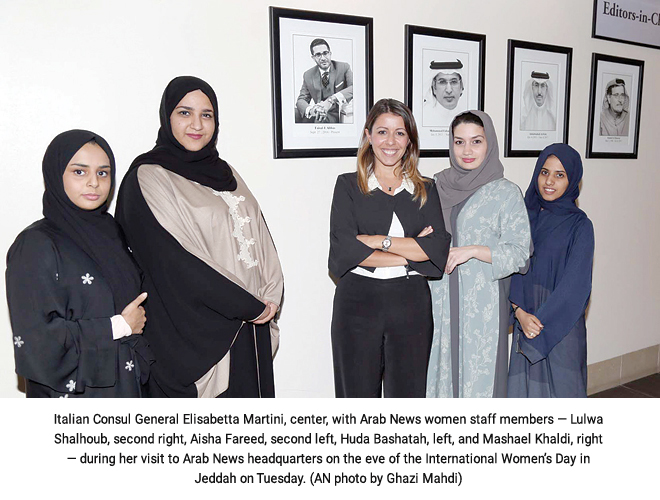
On how challenging it is for a female diplomat in a country where women are not the predominant force in public life, she said: “It’s difficult for women, not just a female diplomat, all over the world, not just in Saudi Arabia. In my country, when I deal with my own people as myself and not as a diplomat, I support women’s rights. Everyone should give this contribution to the development of his or her own country.
“However, one shouldn’t interfere in the policies of other countries. In Italy, there’s a top-down policy that tries to push women into key areas. Women around the world have to work from the bottom up, instead of top-down.” She said people in Italy are surprised to know that she is the consul general in Jeddah.
Regarding Saudi women, Martini said she has seen a lot of changes. “When I came here, I was a bit surprised because the American consul general was a lady before me. The British consul general was a lady some years ago. The German consul general was a lady, so I wasn’t the first lady in the diplomat service here. The difference was that I was young, so I had to prove myself.
“Women are more critical toward other women because we know how much we have to fight and struggle for something. But when you see someone has made it to the top, you ask how she achieved it. Maybe because she’s the daughter of an ambassador? They try to belittle your success.”
Martini said she has interacted with a lot of women here. “Saudi Arabia isn’t one Saudi Arabia. There are different layers of society. There’s a big difference between the various classes of society. Some women who come from opened-minded families don’t have to face any problem. There are women who participate in municipal elections and civic activities.
“But there are some women who face lot of issues. So there are different layers. There are some women in Saudi Arabia who are more qualified than me and can do whatever job they want. Their fathers, husbands and brothers admire them. It’s amazing. But others have to struggle a lot.”
As a diplomat, did she encounter conservatives in the Kingdom, and if so how did she deal with it? “In Saudi Arabia, people recognize authority. They have a very strong sense of authority. They might say ‘you’re a lady and young,’ but they know I represent Italy in Jeddah. They have a strong respect for the state. So as far as I’m the consul general, they respect me. Everyone meets with me in a very respectful way.
“So far, I’ve never met someone who refused to shake my hand. I found Saudis super welcoming. I’m always being welcomed to their houses for big and intimate gatherings. They try to make me feel at ease.”
About women journalists in Saudi Arabia, Martini said: “It’s very important to encourage female journalists because it’s very important to have their point of view. They’ll always have a different point of view. Only they can understand their issues well.”
She said in advanced countries, women do not want to celebrate International Women’s Day as they have already reached gender equality. “But for me this occasion reminds us of the importance of women in society. We need to push the role of professional women in the world. We’re the other 50 percent of society. My message to women is not to rely on the fact that they’re women. They must think of themselves first and foremost as human beings, and go ahead in life.”
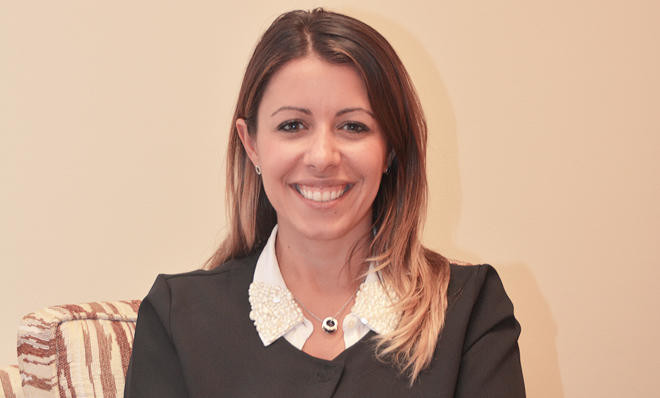

Italy’s first woman consul general sees a multi-layered, dynamic Saudi society
Italy’s first woman consul general sees a multi-layered, dynamic Saudi society

Saudi Arabia acknowledges ‘effective cooperation’ after Lebanese authorities seize narco lab

RIYADH: Saudi Arabia highlighted the productive cooperation between the Kingdom and Lebanon after the seizure of a drugs facility.
The Saudi interior ministry said the lab was being used to manufacture narcotic substances and precursor materials, in addition to firearms.
The ministry statement, posted on social media early on Thursday, said the Kingdom acknowledges the effective cooperation with the Lebanese authorities in monitoring and controlling narcotic substances.
The Kingdom reaffirmed its commitment to continuing efforts to combat criminal activities that threaten its security and youth through drugs, by confronting, thwarting, and apprehending those involved, the statement added.
© 2026 SAUDI RESEARCH & PUBLISHING COMPANY, All Rights Reserved And subject to Terms of Use Agreement.


